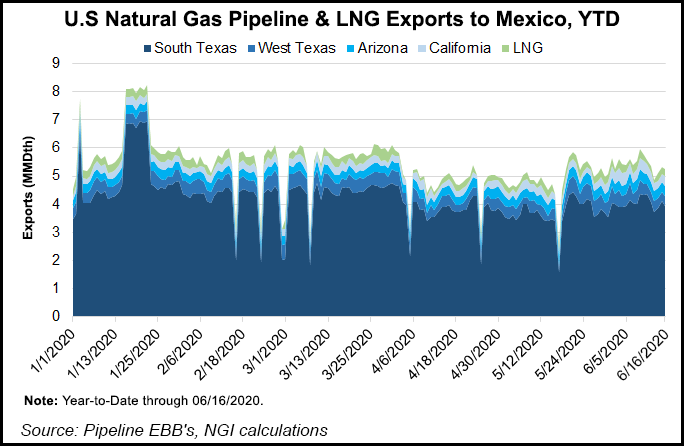Regulatory | NGI All News Access | NGI The Weekly Gas Market Report
Complaint by U.S. Energy Industry’s API Adds to Growing List of Private Sector Concerns in Mexican Energy
American Petroleum Institute (API) President Mike Sommers has sent a letter to U.S. officials expressing the group’s worry that recent actions by the Mexican government are hurting investors in the Mexican energy sector.

In the letter, addressed to Secretary of State Michael Pompeo, Energy Secretary Dan Brouillette, Commerce Secretary Wilbur Ross and U.S. Trade Representative Robert Lighthizer, Sommers highlighted recent regulatory moves in the Mexican energy sector that are “inconstantly applied or inconsistent with past practice.”
Earlier this year, President Trump joined Canada and Mexico in signing the U.S.-Mexico-Canada Agreement, aka USMCA, the revamped North American Free Trade Agreement (NAFTA), which is set to take effect next month. Sommers suggested that these “actions of discrimination” by Mexico are likely to contravene the revamped trade pact.
“We encourage you to use diplomatic channels to engage with the president of Mexico and your Cabinet-level counterparts in Mexico’s agencies to urge the government of Mexico to uphold its USMCA commitments to treat U.S. investors and U.S. exporters fairly on the eve of USMCA entering into force,” Sommers said.
The letter cited changes in regulation that have favored state actors, in particular state oil firm Petróleos Mexicanos (Pemex), and have impacted permitting in the fuels business, but also in regards to liquefied natural gas (LNG) terminals in Mexico being developed by U.S. companies.
Sommers’ letter did not mention any project by name, but the LNG export terminal closest to a final investment decision in Mexico is the Energía Costa Azul (ECA) export project being developed by San Diego-based Sempra Energy subsidiaries in Mexico’s Baja California. The project is being held up in part because it lacks an export permit from the Mexican authorities.
The project already has U.S. Department of Energy authorizations allowing Sempra to export U.S.-produced gas to Mexico and then re-export it globally.
The API letter comes on the heels of other governments expressing concerns about regulation in Mexico that they see as being harmful to outside investment.
Last month, Canada’s Mexico Ambassador Graeme Clark sent a letter to Mexico Energy Minister Rocio Nahle signaling his worry that canceled auctions, permitting delays, along with new regulation in the energy sector that stalled the entrance into operating of renewable power, put at risk $450 million in Canadian investment through companies such as Atco, Canadian Solar, Cubico Sustainable Investments and Northland Power.
Representatives from the European Union have also sent their concerns via a letter to Nahle, in which they state that the new rules would threaten $6.4 billion of investments in clean energy projects.
Members of Mexican business groups Consejo Coordinador Empresarial (CCE) and the American Chamber Mexico said last month in a joint statement the renewable power rules were a violation of the legal framework and could potentially displace any kind of private sector generation project, renewable or not.
“For our industry, the success of the USMCA is grounded in the framework that allows the continued trade flows and capital investments in energy between the three largest North American economies,” Sommers said.
“We have become concerned, however, that recent actions taken by the government of Mexico undermine this framework and discriminate against U.S. investors in violation of commitments that Mexico agreed in both NAFTA and USMCA.”
This week, Canada and Mexico said their shared borders with the United States will remain closed to nonessential travel until July 21. The restrictions have been in place since March.
© 2024 Natural Gas Intelligence. All rights reserved.
ISSN © 2577-9877 | ISSN © 2577-9966 | ISSN © 1532-1266 |
